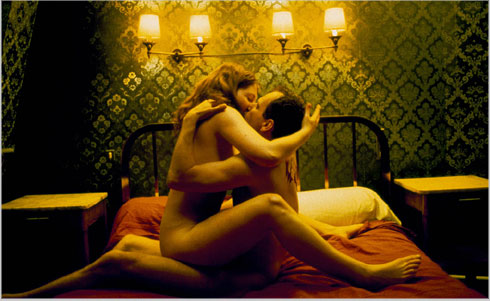From the Chicago Reader (January 28, 2000). — J.R.
L’ennui
Rating *** A must see
Directed by Cedric Kahn
Written by Kahn and Laurence Ferreira Barbosa
With Charles Berling, Sophie Guillemin, Arielle Dombasle, Robert Kramer, Alice Grey, Maurice Antoni, and Tom Ouedraogo.
“To think that I’ve wasted years of my life, that I’ve longed to die, that I’ve experienced my greatest love, for a woman who didn’t appeal to me, who wasn’t even my type!” This despairing reflection by Swann about Gilberte appears at the very end of “Swann in Love,” the longest chapter — a little over 200 pages — in Marcel Proust’s Swann’s Way. The chapter serves as a rehearsal for the even more torturous obsessive love of Marcel, the narrator of Remembrance of Things Past, for Albertine — a topic that practically becomes the novel’s principal subject over the thousands of pages to come.
This acknowledgment of the neurotic irrationality that underlies amorous and erotic obsessions is one of Proust’s key passages, and I was reminded of it periodically over the course of Cedric Kahn’s brilliant and hilarious new sex comedy, L’ennui. Yet one of the most striking aspects of the film — adapted from La noia, a 1960 novel by Alberto Moravia that I haven’t read (also the source for a trashy Bette Davis vehicle, The Empty Canvas) — is the way it confounds its Proustian model of jealousy and sexual paranoia with a dash of healthy common sense. A key line in L’ennui could serve as the ideal riposte to Swann’s lament: “Is there any point in knowing the truth?”
This rhetorical question is offered as a kind of consolation to the obsessed hero, Martin (Charles Berling), by his ex-wife Sophie (Arielle Dombasle), and all she means by it is something Proust seemed to have in mind as well: that the erotic and romantic imagination delivers much more than reality does. Martin is a philosophy professor who starts having an affair with Cecilia (Sophie Guillemin) — a fairly ordinary, imperturbable, and seemingly vacant teenager less than half his age — and he quickly becomes obsessed with her. He’s obsessed not with what’s special about her but with what’s ordinary: her apparent vacuousness, which his feverish imagination ceaselessly tries to fill. Significantly, we never see Martin dealing with philosophy — the only time we ever see him in class someone else is lecturing — unless you want to count his tortured and protracted interrogations of Cecilia. (He’s supposed to be writing a book and tells a colleague he wants to take a sabbatical to work on it. The colleague asks, “Is it in your field? Is it philosophy?” He replies, “Everything is philosophy.”) The ennui of the title, which is implied more than demonstrated, may well refer to the state of being adrift that lands him in his obsession.
A book on my family’s bookshelf throughout my childhood had a title that seemed to address me like a Talmudic directive: Be Glad You’re Neurotic. I never got around to reading the book, but I still recoil at the damage that could be wreaked by that title as a motto to live by, with its invitation to self-indulgence and self-rationalization. This same sensibility is central to the appeal of Woody Allen, and the fact that he’s even more loved in France than in the U.S. suggests that the sensibility conforms with French thinking in general. Proust would have understood perfectly. (Could it be relevant that his mother was Jewish?) Indeed, part of the comedy in L’ennui stems from the respectful tolerance both Cecilia and Sophie usually show toward Martin’s raging neurosis — less out of personal deference than out of a general deference to intellectuals and artists that’s common in France, though not in the U.S. (A similar form of deadpan comedy, even more quintessentially French, can be found in Gerard Mordillat’s 1993 feature My Life and Times With Antonin Artaud, which might be subtitled Be Glad You’re Psychotic.)
As the film opens, we get a taste of Martin’s neurosis and of his expectation that he’ll be indulged. He turns up in a sour mood at a party being given by Sophie and gets angry when his ex-wife tries to match him up with a fawning student. He circles the flat like a nervous animal, then leaves abruptly once he discovers that Sophie can’t or won’t devote all her attention to him. A little later he explains to a doctor who’s just told him he’s in fine health that his nervousness can be explained in part by his deliberate avoidance of sex and love; he says he’s channeling that energy into a book he’s writing — though we eventually discover that he isn’t getting much writing done either.
Idly driving one night through Pigalle, he follows a couple on the street — a teenager with a much older man — until she breaks away from him. Then he parks and follows the man into a seedy bar, where he resists the blandishments of a call girl. He stares at the older man, who’s sitting alone, and then the man announces that he left his wallet at home and tries to leave. As a couple of bouncers prepare to beat him up, Martin offers to pay his tab and invites him to have another drink; the man, named Meyers, declines, but hands him a painting he’s done, along with his address, as collateral.
When Martin turns up at Meyers’s flat a few days later, he discovers from a concierge that Meyers died the day before, while having sex. Meyers is played by the late Robert Kramer, a leftist American independent filmmaker best known for Ice (1969), Milestones (1975), and Route One/USA (1989); he’s been making films in Europe as an expatriate living in France for the past quarter of a century, and he died in France at the age of 60 last November. He isn’t generally known as an actor, though I saw him perform powerfully in a recent video by Lou Castel called Just in Time, and his haunting appearance in L’ennui is all the more poignant because his own unexpected death echoes that of Meyers.
Entering Meyers’s studio to return the canvas, Martin encounters Cecilia, the dead man’s model and lover, who’s gathering up some of her belongings. He fires personal questions at her, and she answers them. It’s the longest scene in the film — the dialogue lasts almost nine minutes — and much as “Swann in Love” anticipates the later volumes of Remembrance of Things Past, it gives us a taste of their future relationship: shortly afterward, she starts meeting him daily at his flat for sex. The fact that she occasionally cheated on Meyers, who was every bit as obsessive as Martin, also foreshadows her dual affair with Martin and someone close to her own age (Tom Ouedraogo).
Kahn shows the sex between Cecilia and Martin quite realistically and bluntly, but without ever threatening to turn L’ennui into a porn film. He never makes the mistake of depersonalizing the various couplings and turning them into some sort of display of sex in general, and he doesn’t force Martin to screw neurotically or Cecilia to screw vacantly. In other words, he makes their sex look fairly attractive and healthy, providing us with our only solid clue as to why she’s willing to put up with his incessant jealousy and suspicions.
Much of what makes these sequences so good is the talent of the actors. Berling, a relatively known quantity, has been seen in Ridicule, Nelly and Monsieur Arnaud, Dry Cleaning, Petits arrangements avec les morts, and Those Who Love Me Can Take the Train; he also played the lead — the Jean-Pierre Léaud role — in a stage adaptation of Jean Eustache’s The Mother and the Whore, which seems even more relevant. But the real revelation here is Guillemin, making her acting debut at age 20, already a skilled and authoritative performer. She also happens to be heavyset, representing a relatively ordinary physical type that’s rarely shown in movies — a lovely dose of reality.
Reviewing this movie favorably last month in Cahiers du Cinéma, Thierry Jousse compares Cecilia to the fleshy models of Auguste Renoir; reviewing it in Positif, Françoise Aude compares her to the fleshy models of Pablo Picasso during the early 1920s. It’s an understandable connection, given that her character starts out as a model for Meyers. But even more impressive is how thoroughly her character deconstructs the misogynist movie-derived model of the femme fatale — the noir cliché that continues to clog up our culture. (This week has thrown up an especially offensive example, Eye of the Beholder [1], but there are always several per month.) Cecilia isn’t conniving or deceptive or sadistic or manipulative, and it’s part of the comic point of this movie that it’s her lack of such traits that drives Martin around the bend. Part of the vacancy he is — and by implication we are — so intent on finding in her simple directness derives from an inability to come up with an alternative to the bitch-goddess prototype for Western sexual mythologies. Martin appears to be applying, neurotically, to become Meyers’s doppelganger, and Cecilia’s lack of destructiveness and guile keeps forcing him to imagine sinister outcomes. It’s a game we all play to some extent with conventions — in and out of bed, in and out of movies — and it’s bracing to watch a movie that has the smarts to show us what we’re doing.






